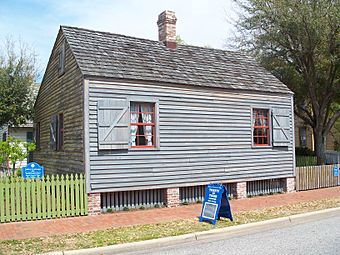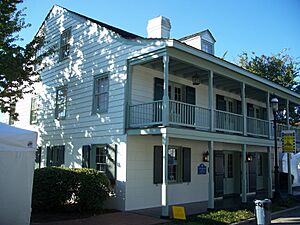Pensacola Historic District facts for kids
Quick facts for kids |
|
|
Pensacola Historic District
|
|

Julee Cottage, in the district
|
|
| Location | Pensacola, Florida |
|---|---|
| Area | 108 acres (44 ha) |
| NRHP reference No. | 70000184 |
| Added to NRHP | September 29, 1970 |
The Pensacola Historic District is a special area in Pensacola, Florida, that helps us remember the past. It is also known as the Seville Historic District. This area was officially recognized as a historic district on September 29, 1970.
This important district covers about 108 acres. It is located near Bayfront Parkway, Tarragona, Romana, and Cevallos Streets. Inside this district, you can find the Historic Pensacola Village, the Pensacola Museum of History, and Seville Square. Seville Square and its partner, Plaza Ferdinand VII, were once used as parade grounds. This was when the Fort of Pensacola was built during British rule. There is also a very old European settlement site nearby. It dates back to 1559, making it one of the earliest known settlements in North America.
Contents
Protecting Pensacola's History
The Pensacola Heritage Foundation
In the early 1960s, a group of people who loved history formed the Pensacola Heritage Foundation. A local leader named Mary Turner Rule helped start this group. They joined a national organization called the National Trust. The group then looked closely at the Seville Square Historic District. This area is next to Pensacola Bay.
Mary Rule and the Heritage Foundation understood how important Pensacola's history was. They wanted to save it. So, they worked to get the Pensacola Historic District listed on the National Register of Historic Places. This is a list of places important to American history. The group also bought and fixed up the Clara Barkley Dorr House. They convinced the city to restore Seville Square to its beautiful state today. To get people interested, they created a fun festival called "An Evening in Old Seville Square." This event encouraged people to help restore the district. Mary Rule also helped get the famous lighthouse at the Navy Air Station listed on the National Register. She helped create a state board too. This board now works to protect the Seville Square Historic District and Pensacola's history. The city also created an Architecture Review board. This board helps protect Pensacola's historic buildings locally.
The UWF Historic Trust
In 1967, the Pensacola Historical Preservation and Restoration Commission was created. Its goal was to save Pensacola's history. This included its old buildings and monuments. It also aimed to teach people about the past. In 2001, the Florida government changed this organization. Its collections and buildings were given to the University of West Florida (UWF).
Later, in 2009, the Pensacola Heritage Society joined with this organization. They became the West Florida Historic Preservation. In 2013, the name changed again to the UWF Historic Trust. This group continues to protect and share Pensacola's rich history.
Historic Pensacola Village
Historic Pensacola is a special place within the Pensacola Historic District. It has 28 historic buildings and museums. The University of West Florida's Historic Trust manages them. Historic Pensacola is in downtown Pensacola, Florida. It is located between Plaza Ferdinand VII and Seville Square.
Buildings and Museums to Explore
Historic Pensacola Village offers many interesting places to visit:
- Pensacola Museum of History: Learn about the city's past.
- Pensacola Children's Museum: A fun place for younger visitors to learn.
- Museum of Commerce: This museum shows what a Pensacola street looked like between 1880 and 1910. It has stores for toys, leather goods, hardware, and music. There is also a print shop, a gas station, and a tram. The print shop has one of the best collections of old printing presses in the Southeast.
- Museum of Industry: Discover how people worked and made things in the past.
- Voices of Pensacola Multicultural Center: Learn about the many different cultures that shaped Pensacola.
- Old Christ Church: A very old church with a lot of history.
- Bowden Building: The first floor has classrooms for the University of West Florida. It also holds some of Historic Pensacola's collections. The top floor has offices for Historic Pensacola.
- Tivoli High House: This was once a boarding house. Now, it is used as the ticket office for the Village.
- Lavalle House: Another historic home to explore.
- Lear-Rocheblave House: A historic home restored to look like a boarding house from the 1920s.
- Dorr House: An important historic home.
- Manuel Barrios Cottage: A charming old cottage.
- Julee Cottage: A historic home once owned by Julee Panton. She was a free woman of color. Other Black families also lived here.
- Barkley House: Another historic house.
- John Appleyard Cottage: A historic cottage.
- Fountain Park: A lovely park area.
- Colonial Archaeological Trail: Explore where old settlements once stood.
- Pensacola Museum of Art: See beautiful artworks.
Image Gallery
 | William M. Jackson |
 | Juan E. Gilbert |
 | Neil deGrasse Tyson |












